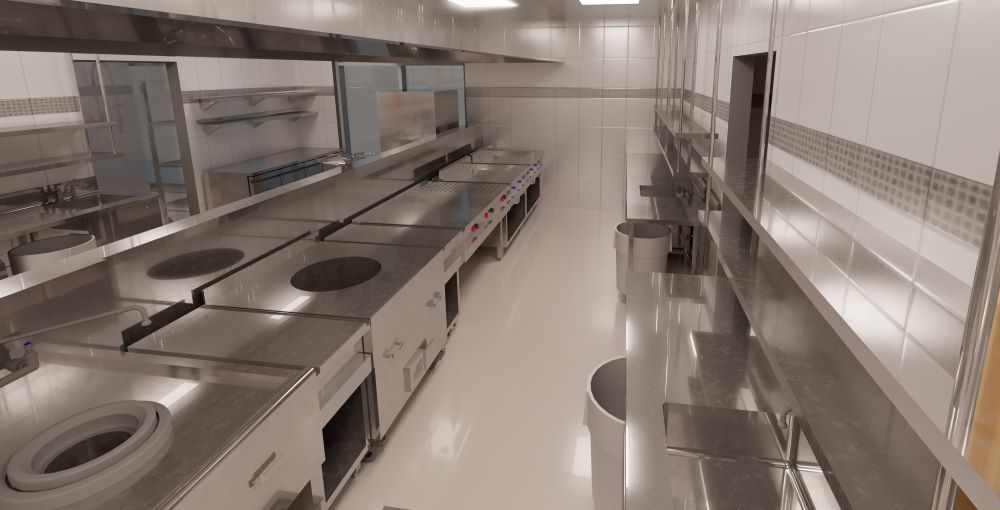Commercial kitchens are commercial set-ups that carry out the function of preparing and storing food safely and efficiently. Also known as Commissary Kitchens, these kitchens are a common feature in restaurants, cafeterias, bakeries, hotels, educational institutions, hospitals, etc.
What is the main purpose of a commercial kitchen?
Ans: The main purpose of a commissary kitchen is to prepare and provide food in large quantities, in a limited frame of time, while adhering to food safety codes and protocols.
Let’s go through some points that are a major area to be focused on while planning a commercial kitchen:
1) Delivery time of the food
‘Time is of the essence’ in a commercial kitchen set-up. From the food preparation to the delivery of the food, all the actions in a commercial kitchen must be done systematically. That is why it is crucial to design and plan an organized commercial kitchen.
2) Storage facilities for the food
Storage in a commercial kitchen can be split into:
- Non-food storage: A section dedicated to disposable objects, kitchen equipment, cleaning supplies, and washing area.
- Cold storage: A section dedicated to refrigerators, Freezers
- Dry Storage: A section dedicated to storing perishable and non-perishable items.
3) Food Preparation
This is the most important area in a commercial kitchen. This area consists of:
- Sinks for washing produce
- Cutting and mixing areas
- Section for processing raw foods
- Section for sorting foods
- Food preparation counters
- Preparing plates
4) Cooking equipment required
Commercial kitchens need different types of equipment such as:
- Range, Oven, Grill, Deep-fryer
- Reach-in and Walk-in cooler, Refrigerator, and Freezer
- Sauté pans, saucepans, stock and soup pots
- Baking sheets, Baking pans, and Pizza screens
- Tongs, Spatulas, and Ladles
- Chef’s knives
- Pizza paddle, Whisks, and Mixing Bowls
- Steam table
- Entrée plates, Appetizer plates, Pasta bowls, Salad plates, and Dessert plates
- Metal or plastic shelves for walk-in cooler
- Cleaning rags, Cleaning buckets, and Rubber floor mats
- Hand soap and sanitizer dispensers
- Fire extinguisher
5) Ergonomic design of the kitchen space
While planning a commercial kitchen space, the kitchen layout needs to have a touch of ergonomics. Comfort and effectiveness are two components to be kept in mind. In simple words, the commercial kitchen space needs to be user-friendly. The kitchen staff who spend most of the time in a commercial kitchen space, multi-tasking, need their space to be organized. An area that helps them reach their greatest potential and deliver results in a timeframe with ease.
Example: In a commercial kitchen, if an under-counter freezer is placed right beside the deep fryer allowing the fry cook to retrieve foods and place them in the fryer with little effort.
The ergonomic design even extends to things like equipment selection and lighting. Having the right equipment for the job makes cooking easier and keeps employees happy. Good lighting allows the kitchen staff to see their actions clearly and perform all their duties safely.
6) Modularity
In simple words, a kitchen space must be flexible. Menus are subject to change in various commercial kitchens. To help kitchens adapt to this change frequently, a commercial kitchen must be modular. Where cabinets and appliances can be rearranged and moved easily.
7) Sanitation and Health standards
The last, but the most important aspect to keep in mind while planning and designing a commercial kitchen is adhering to health, safety, and sanitation codes and protocols as devised by local authorities and the government. It’s important for any new food service provider setting up a commercial kitchen to be familiar with the state and local area health and sanitation codes.
Sanitation is a crucial part of maintaining the health and safety of a foodservice operation. While this is a function that rests in the hands of a diligent and well-trained staff, there are ways of planning a kitchen with sanitation needs in mind that can make cleaning much easier in the long run.
Paying close attention to local codes and regulations when considering sanitation. Most of them will include several standards, such as how far food prep stations must be from waste disposal stations, and where handwashing sinks must be placed.
8) Energy Efficiency
Commercial Kitchens of today must be mindful of their energy consumptions. It is always smart to invest in energy-efficient appliances and make efforts in reducing the carbon footprint of the kitchen.
Commercial Kitchen Planning can be a breeze for a food service provider when an expert is hired. An expert that understands the need for an efficient commercial kitchen set-up, that too on a budget.
One such expert that exists in the industry today is Kilowa. It is the brainchild of a foodservice conglomerate. It borrows from the rich experience and expertise of HPG consulting, making it affordable and quicker for smaller projects. Kilowa aims at providing efficient, economical, and affordable services and solutions to its clients. Their team is passionate, multifaceted, and multitalented. Kilowa has a track record of delivering excellence and guaranteeing excellence in the quality of their service. Their clientele consists of giants in the food and beverage industry such as Marriott, Hyatt, Taj, Hilton.
Kilowa is known to use the best methodologies and cutting edge tech for their clients.
While planning a commercial kitchen, Kilowa employs a team of experienced consultants that are known to deliver creative solutions at every step of the process. Kilowa’s consultants provide exceptional insights into strategy, planning, and design while keeping their client’s budgets in mind. The consultants coordinate with CAD designers, architects, designers, engineers, and contractors involved in their client’s commercial kitchen projects, study every aspect of this decision-making at each step, and execute the best possible plans.
Design is crucial for a commercial kitchen project. Kilowa’s consultants work closely with contractors in helping their clients achieve a high-end quality product design that is user-friendly and budget-friendly.
If you’re a new food start-up business that is in urgent need of a commercial kitchen plan while facing a budget constraint, Kilowa is the right food consultancy for you. Because the ability to create and design something unique while solving a problem is a priority at Kilowa.
Satisfy your curiosity about commercial kitchen planning by reaching out to a Kilowa team member today.







